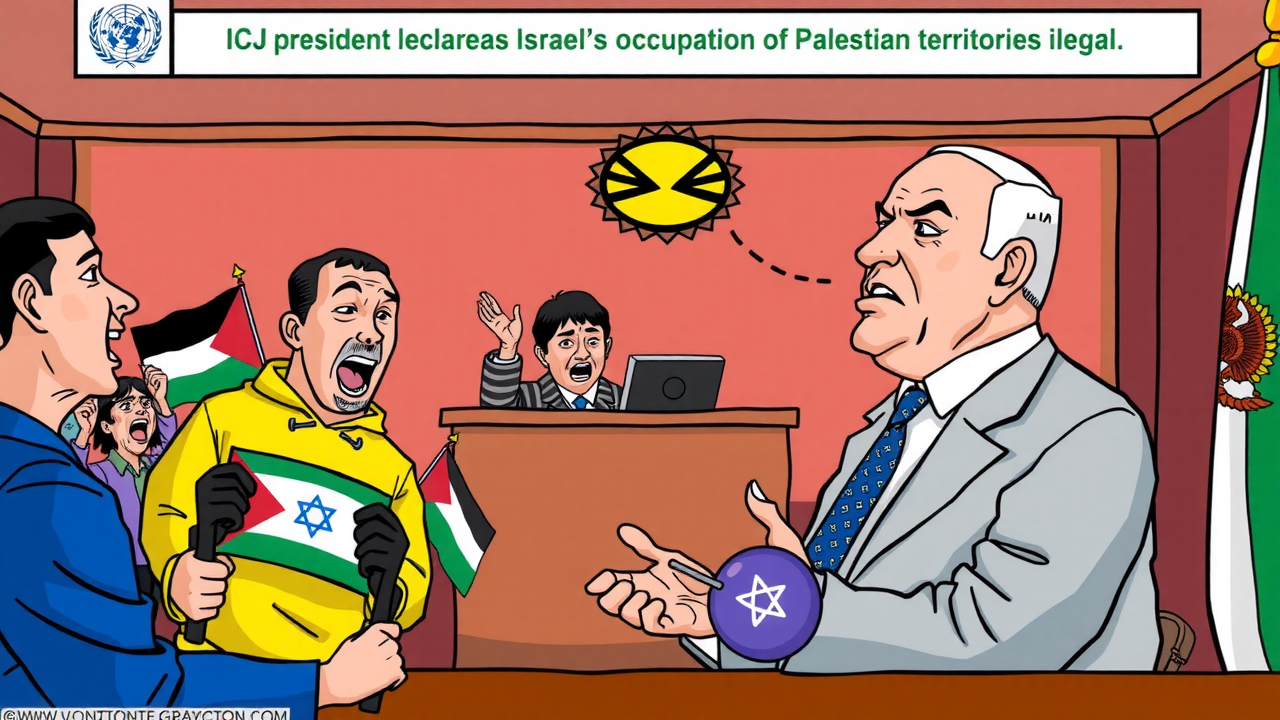The International Court of Justice declared that Israel’s occupation of Palestinian territories and settlements is unlawful and should end immediately. Though not legally binding, the advisory opinion carries significant political weight and marks the first time the ICJ has addressed the occupation’

The International Court of Justice on Friday declared that Israel’s occupation of Palestinian territories and the settlements there are unlawful and should be withdrawn as soon as possible.
The Court’s advisory opinion, though not legally binding, holds substantial political significance. This marks the first instance in which the ICJ has addressed the legality of the 57-year occupation.
ICJ has been reviewing the issue since early last year following a request from the UN General Assembly.
The court was asked to provide its opinion on Israel’s policies and practices towards the Palestinians and the legal status of the occupation.
ICJ President Nawaf Salam said it had found that “Israel’s… continued presence in the Occupied Palestinian Territory is illegal.” He added, “The State of Israel is under the obligation to bring an end to its unlawful presence in the Occupied Palestinian Territory as rapidly as possible.”
He stated that Israel’s 2005 withdrawal from the Gaza Strip did not end its occupation of the area, as it still maintains effective control over it.
The court also asserted that Israel should remove all settlers from the West Bank and East Jerusalem and compensate Palestinians for the damages caused by the occupation.
Since 1967, Israel has constructed around 160 settlements, housing approximately 700,000 Jews in the West Bank and East Jerusalem. The court declared these settlements illegal, a claim Israel has consistently contested, arguing they do not violate international law.
The ICJ stated that Israel’s “policies and practices amount to annexation of large parts of the Occupied Palestinian Territory,” which it declared to be against international law. The court added that Israel is “not entitled to sovereignty” over any part of the occupied territories.
Israel claims sovereignty over all of Jerusalem, including the eastern half it captured in the 1967 Middle East war, and regards the city as its indivisible capital—a stance not accepted by the vast majority of the international community.
Israel Response
Israeli Prime Minister Benjamin Netanyahu said the court had made a “decision of lies”.
He said, “The Jewish people are not occupiers in their own land – not in our eternal capital Jerusalem, nor in our ancestral heritage of Judea and Samaria” (the West Bank). He added, “No decision of lies in The Hague will distort this historical truth, and similarly, the legality of Israeli settlements in all parts of our homeland cannot be disputed.”
Palestine Response
The Court’s findings were welcomed by the Palestinians. Hussein Al-Sheikh, the secretary general of the Palestine Liberation Organisation (PLO), the main umbrella group for Palestinians, described it as “a historic victory for the rights of the Palestinian people and their right to self-determination.” He added that it signifies “the collapse and defeat of the Judaization project through confiscation, settlement, displacement, and racist practices against a people under occupation.”
“The international community must respect the opinion of international justice and force Israel to end its occupation of the Palestinian territories,” he said.
The court’s findings will now be presented to the UN General Assembly, which will determine how to respond, including the possibility of adopting a resolution. This step would be significant, potentially acting as a catalyst for negotiations and setting the legal parameters for a future settlement. A resolution from the General Assembly could increase international pressure on Israel and provide a framework for renewed diplomatic efforts to resolve the conflict. Additionally, it could reinforce the Palestinian position in any future talks, emphasizing their claims to self-determination and their objections to Israeli settlements and policies in the occupied territories.





